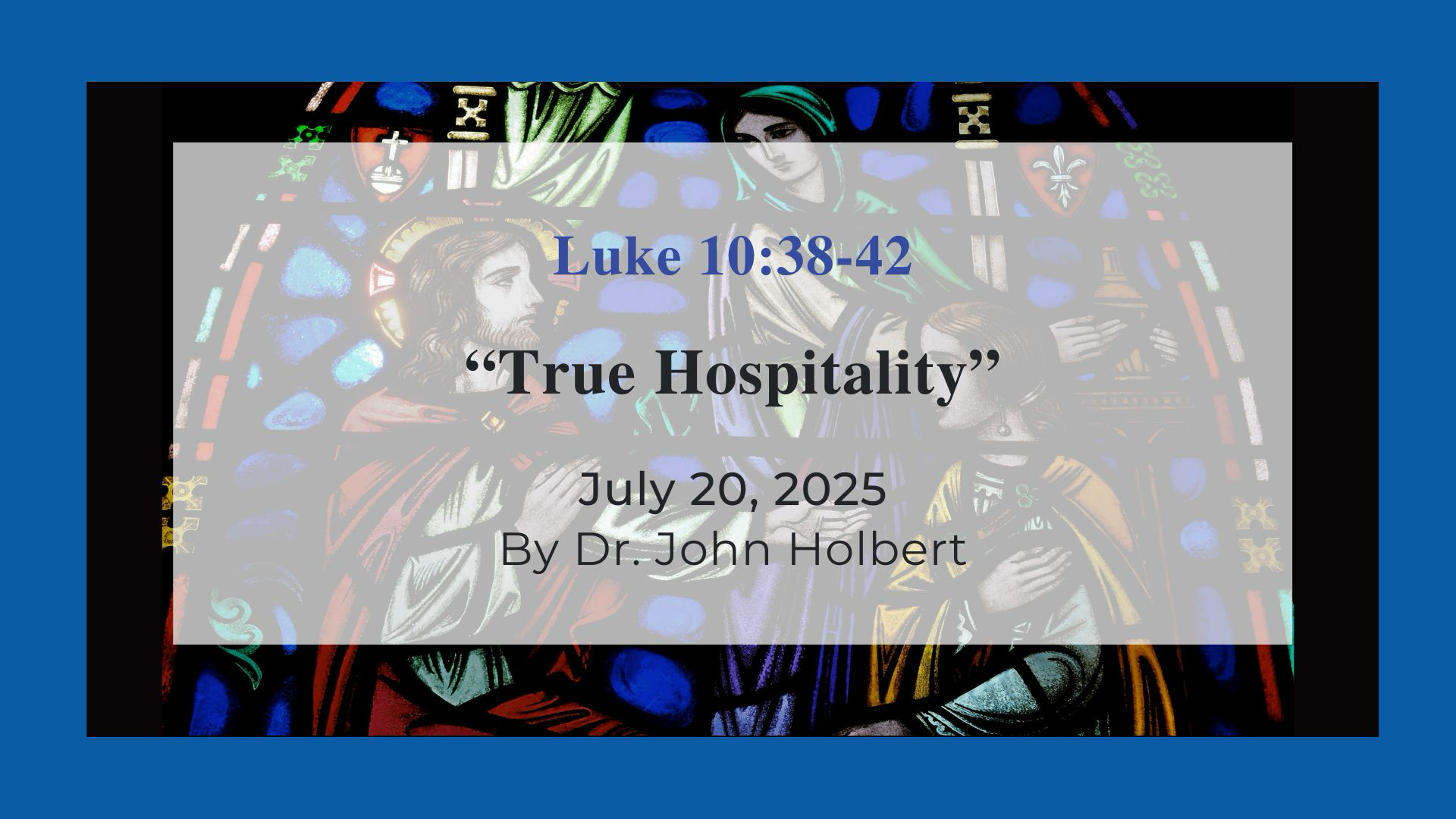True Hospitality - Relfections on Luke 10:38-42, Pentecost 6, Year C
by john C. Holbert on Thursday, May 15, 2025

Today we have the very famous tale of Mary and Martha, and their quite different receptions of the wandering prophet, Jesus. How many sermons have been preached that struggle to understand what we are to make of Martha, the distracted and troubled sister, nonetheless performing the crucial work of domestic service, as contrasted with her sister Mary, who sits eagerly at the feet of Jesus, listening to his every word? How many women have classed themselves among the world’s Marthas, dutifully serving others, while the Marys are afforded the opportunity to participate with the listeners to the Master’s words? How often have people leaving the worship service been heard to say, “Well, the world always needs Marthas, faithful in their service for others, staying in the kitchen, baking and cleaning up.” Who could deny that that is all too true?
But is this short tale about a comparison between workers and those who take advantage of their selfless work? Are we asked, after observing this scene, to be grateful for our Marthas, despite the fact that the story ends with Jesus’s words: “Mary chose the right part,” a phrase that might be better translated, “Mary made the right choice” (Luke 10:42)? And because of that word of Jesus, are all Marthas then to be denigrated as “not” choosing the right thing? This tiny narrative has caused no end of confusion and sharp judgments of very human behavior. We need to look again more carefully.
Right after the universally-known tale of the Good Samaritan, Luke offers this small story, which seems somehow anti-climactic after that astonishing Good Samaritan amazingly continues to aid that half-dead victim. Is there finally any relationship between these stories? Jesus is still in Samaria, and hence among many who do not readily welcome any traveling Jew. He enters a “certain village,” unnamed but clearly a Samaritan one, and finds a house where “a woman named Martha welcomed him” (Luke 10:38). Middle-Eastern hospitality demands apparently apply even here in Samaria, because he is “welcomed” by Martha. Rather like the Good Samaritan, who, against type, aids the victim in the ditch, so here the Samaritan Martha also welcomes Jesus, the Jew, accepting his presence in her home. But the story goes on to refine and clarify what such hospitality means when a prophet enters a house.
Martha retires to the kitchen for service, certainly a necessary activity of welcoming a stranger, while her sister Mary, “sat at the feet of Jesus and listened to him speak” or more literally “listened to his word (logos)” (Luke 10:39). Martha, however, is at work. “Martha was overwhelmed by so much serving. She came up and said, ‘Lord, does it not concern you that my sister left me alone to serve? Tell her to help!’”(Luke 10:40). The verb translated “overwhelm” carries the sense of “being distracted.” The reason for that is that there just is too much to do! Martha is not obsessively distracted; she simply cannot handle all the chores alone! Martha’s question echoes that found in Mark 4:38, as the terrified disciples in the pitching boat ask the sleeping Jesus, “Don’t you care about us?” The questions are in reality accusations: you have abandoned us, Jesus, scream the disciples; my sister has abandoned me, shouts Martha.
Jesus’ reply is instructive. “Martha, Martha, you are anxious and troubled by many things” (Luke 10:41). “Anxious” (mirimnao) in other places means life’s tangles (see Matt. 6:25-34 and Luke 12:26 as examples). “Troubled” (thorubazomai) suggests “making an uproar.” Jesus says that Martha is “putting herself in an uproar.” “There is need for only one (thing),” he continues. This implies that the central concern of hospitality for any guest, let alone a prophetic one, is to pay attention to him; all other behaviors, including anxious and troubling service, are optional. “Mary,” he concludes, “chose the good part, or as I suggested above, “made the right choice.” Luke uses the word “agathos,” here translated “right,” meaning the choice has a moral dimension; listening to the prophet’s word is morally correct, and will lead to correct actions, too. Jesus has come to proclaim the “word,” and expects all to listen to that word and to act upon it. Martha needs to join Mary in listening to Jesus, for that is the “right choice.” Like the Good Samaritan’s actions with the abused victim, lauded by Jesus as the way to be, so Mary’s choice to listen will lead her to becoming a true follower of this Jewish prophet. Rather than act as the two who avoided help for the half-dead victim, or the self-serving lawyer wishing to ensure eternal life for himself, or even the furious but dutiful Martha, Jesus calls us to emulate the Good Samaritan and Mary, and listen to the word he brings and act upon it.
